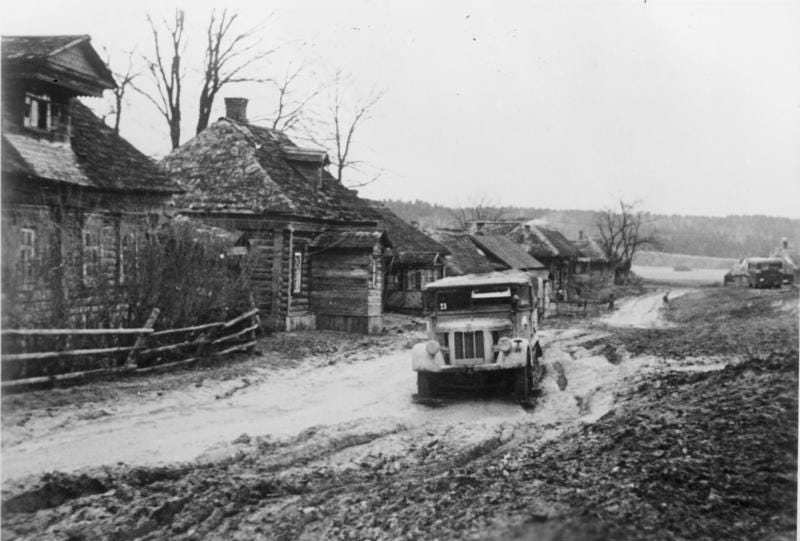Army Group Center slows in the mud
8th October 1941: The 'Rasputitsa' or 'season without roads' arrives
The launch of Operation Typhoon had begun well for the Germans. What was intended to be the final battle of the year, the assault on Moscow, had seen further sweeping Blitzkrieg operations that had encircled even more of the Soviet forces.
Then after just a week of such success everything changed. Diary after diary notes the sudden deterioration in the weather.
Ludwig Kolodzinski1 serving with the 2nd Panzer Army was woken by his radio operator at 2am on the 8th October and urged to look outside:
It was snowing! The wind drove thick clouds of snowflakes across the earth and the ground was already covered in a thin sheet of snow. Even the assault guns parked outside on the road had taken on a curious appearance. They were completely white as if covered in icing sugar!
I recorded this first snowfall in my diary and went back inside to lie down again. When I awoke in the morning and glanced outside, the snow had already gone. But as a consequence the road was covered in mud and the land around totally soaked.
Hans Roth2 ...
8th October
The roads are rivers of mud; man and machine each give it their best. Without any significant enemy contact, we press on to Nidregaylow. Lying on the roads are dead horses, abandoned cars, burned out tanks, uniforms that have been ripped to shreds, ammunition scattered all over the roads and fields, harvests, that have been destroyed and trampled over.

Siegfried Knappe3 ...
In late September, it began to rain, and mud started to become a problem for us. Wind whipped the rain into our faces and soaked our uniforms as we marched. Snow came in early October, but it was not cold enough for the ground to freeze and everything turned to mud. By October 8, the earth was simply a quagmire of mud. Great clumps of mud clung to our boots and every step produced a smacking suction noise. It played havoc with the horses.
Even the Russians realised that it was a particularly bad year for the rasputitsa - literally the ‘time without roads’.
Journalist Vasily Grossman4 only just managed to escape from the vast German encirclement on the Bryansk Front, and he knew the reason why:
I don't think anyone has ever seen such terrible mud. There's rain, snow, hailstones, a liquid, bottomless swamp, black pastry mixed by thousands and thousands of boots, wheels, caterpillars. And everyone is happy once again. The Germans must get stuck in our hellish autumn, both in the sky and on the ground. At any rate, we have managed to escape from the sack.

Quoted by Robert Kershaw in War Without Garlands: Operation Barbarossa 1941-1942.



